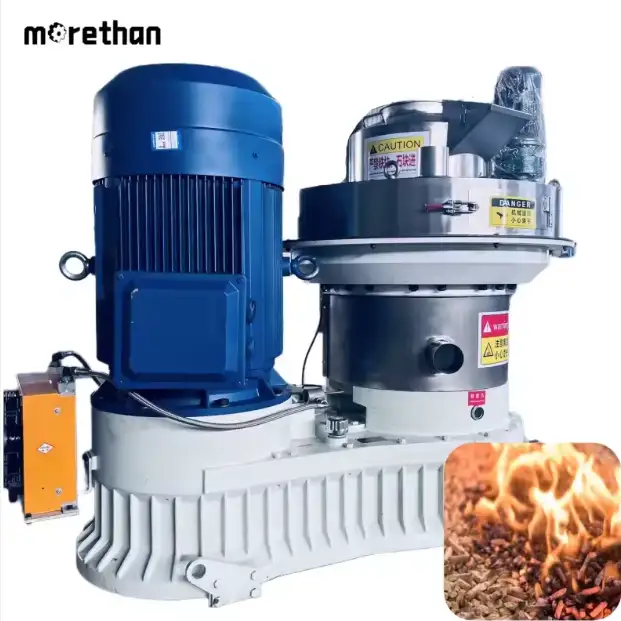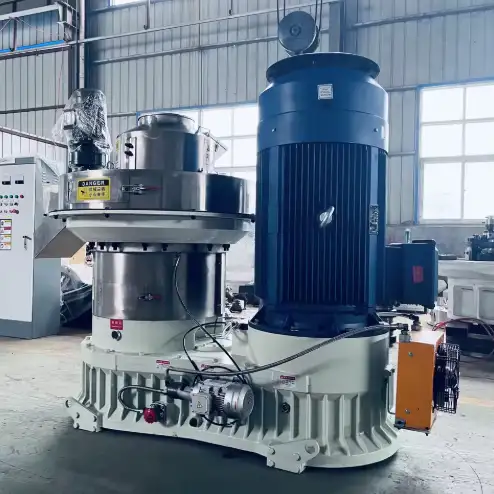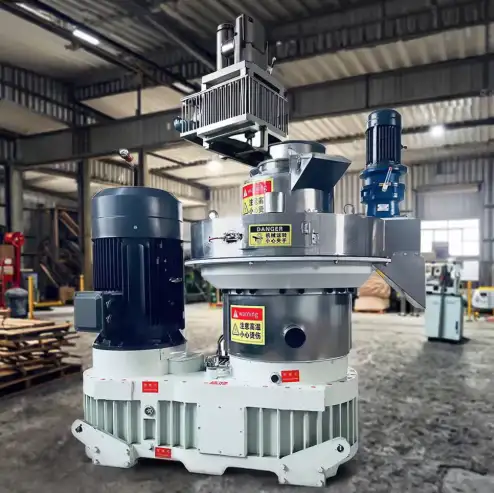Electric Pellet Mill
Products
PRODUCTS
CONTACT US
The Electric Pellet Mill is an essential piece of equipment in the field of feed, biomass, and pellet production. It converts raw materials, such as grains, wood, or agricultural by-products, into high-density pellets. These pellets are used in a variety of applications, ranging from animal feed to biofuel production. The electric version offers a more energy-efficient and environmentally friendly solution compared to its diesel or gas-powered counterparts.
1. What is an Electric Pellet Mill?
An Electric Pellet Mill is a machine designed to convert raw materials such as wood, biomass, or agricultural waste into cylindrical pellets through compression. These pellets can serve multiple purposes, including animal feed, fuel for heating, or as a renewable energy source. Electric pellet mills are powered by electricity, making them more sustainable and less polluting compared to their fuel-powered counterparts. The process of pelletizing improves the density and usability of raw materials, enabling easier storage, transportation, and handling.
2. Key Features of Electric Pellet Mills
| Feature | Description |
|---|---|
| Energy Source | Operates using electricity, reducing carbon emissions compared to other mills. |
| Pellet Size | Adjustable pellet sizes for various applications. |
| Efficiency | High energy efficiency and lower operating costs compared to diesel mills. |
| Maintenance | Requires less frequent maintenance, making it cost-effective long term. |
| Capacity | Available in a range of capacities, from small-scale to industrial production. |
| Durability | Built with high-quality materials to withstand heavy use and pressure. |
3. Types of Electric Pellet Mills
Electric Pellet Mills are classified based on their capacity, design, and intended use. The two main types are:
-
Flat Die Pellet Mill – Most commonly used for small to medium-scale production.
-
Ring Die Pellet Mill – Ideal for large-scale industrial production due to higher output efficiency.
4. How Electric Pellet Mills Work
Electric Pellet Mills work by feeding raw materials into a die, where they are compressed under high pressure. The rotating roller forces the material through the die holes, shaping them into pellets. The pellets are then cut to the desired length. The process involves heating the raw materials, which causes them to release moisture, making them denser and easier to handle.
5. Advantages of Electric Pellet Mills
-
Eco-Friendly: Electric-powered mills produce no harmful emissions, making them environmentally friendly.
-
Cost-Effective: The operating costs are lower compared to diesel mills due to reduced fuel costs.
-
Consistency: Electric pellet mills produce uniform pellets, ensuring high-quality output.
-
Ease of Use: These mills are user-friendly and require less maintenance than other types.
6. Applications of Electric Pellet Mills
Electric Pellet Mills are widely used in several industries:
-
Animal Feed Production: Pellets are made from grains, alfalfa, and other ingredients to provide high-quality nutrition for livestock.
-
Biomass Energy: Wood and other organic materials are turned into pellets for use in biomass heating systems.
-
Agricultural Waste Management: Agricultural residues like straw and corn stalks are pelletized for easier disposal and energy use.
7. Factors to Consider Before Buying an Electric Pellet Mill
When purchasing an electric pellet mill, consider the following factors:
-
Capacity: Choose a mill that matches your production needs.
-
Power Requirements: Ensure that the mill’s power specifications align with your electricity supply.
-
Material Type: Some mills are better suited for wood, while others work better with grains or agricultural by-products.
-
Price and Warranty: Ensure that the cost of the mill fits your budget and that you have access to reliable after-sales service.
8. Maintenance and Care of Electric Pellet Mills
Proper maintenance is crucial for the longevity of your electric pellet mill. Here are a few tips:
-
Regular Cleaning: Clean the mill after each use to prevent dust and residue buildup.
-
Lubrication: Lubricate the moving parts as recommended by the manufacturer.
-
Check for Wear: Regularly inspect parts like the rollers, die, and motor for wear and tear.
9. Electric Pellet Mill in Biomass Fuel Production
Biomass pellets produced by electric pellet mills are a renewable energy source, reducing the reliance on fossil fuels. These pellets can be used in stoves and boilers for heating, providing a sustainable alternative to oil and gas.
10. Electric Pellet Mill vs. Diesel Pellet Mill
| Feature | Electric Pellet Mill | Diesel Pellet Mill |
|---|---|---|
| Energy Source | Electricity | Diesel |
| Emissions | Low or zero emissions | Higher emissions |
| Operating Costs | Lower operating costs | Higher fuel costs |
| Maintenance | Easier maintenance | Requires more frequent maintenance |
| Capacity | Suitable for small to medium scales | Ideal for industrial scale production |
11. The Future of Electric Pellet Mills
As the world continues to shift towards renewable energy and sustainability, electric pellet mills will play a vital role in reducing greenhouse gas emissions. Innovations in energy efficiency and automation are expected to make these mills even more powerful and efficient.
12. Common Problems and Solutions
| Problem | Solution |
|---|---|
| Pellets not forming | Ensure the die is not clogged and check the moisture content of the raw material. |
| Overheating | Reduce the load on the motor or improve ventilation. |
| Frequent breakdowns | Regularly inspect and replace worn-out parts. |
13. FAQs
-
How long do Electric Pellet Mills last?
Electric Pellet Mills can last up to 10-15 years with proper maintenance. -
Can I use an Electric Pellet Mill for wood?
Yes, electric pellet mills are commonly used for wood pellet production. -
What is the average capacity of an Electric Pellet Mill?
The capacity ranges from small-scale mills (100-500 kg/h) to industrial mills (over 1 ton/h). -
How do I choose the right Electric Pellet Mill for my needs?
Consider factors such as material type, production capacity, and budget. -
Do Electric Pellet Mills require a lot of maintenance?
They require less maintenance than other types of mills but should be cleaned and lubricated regularly.



